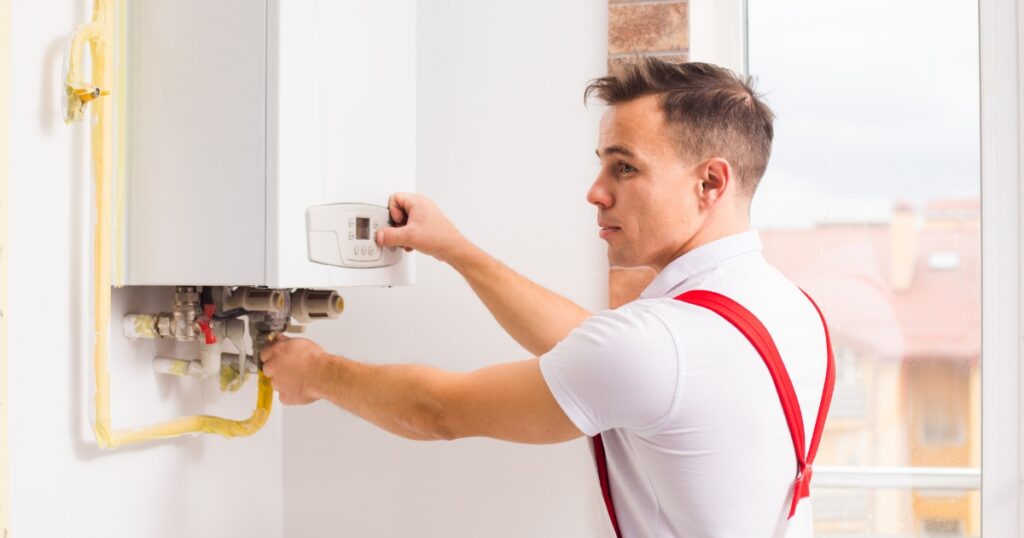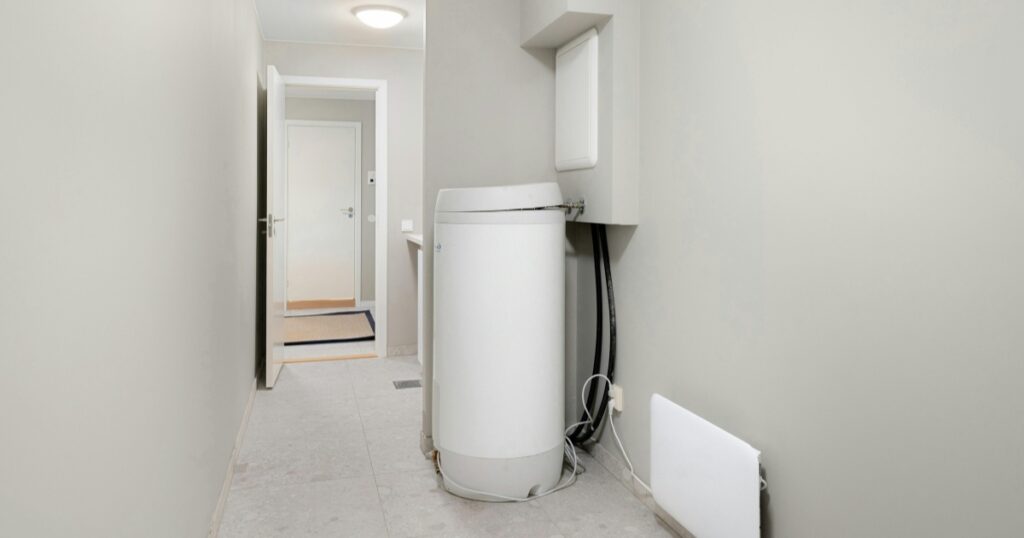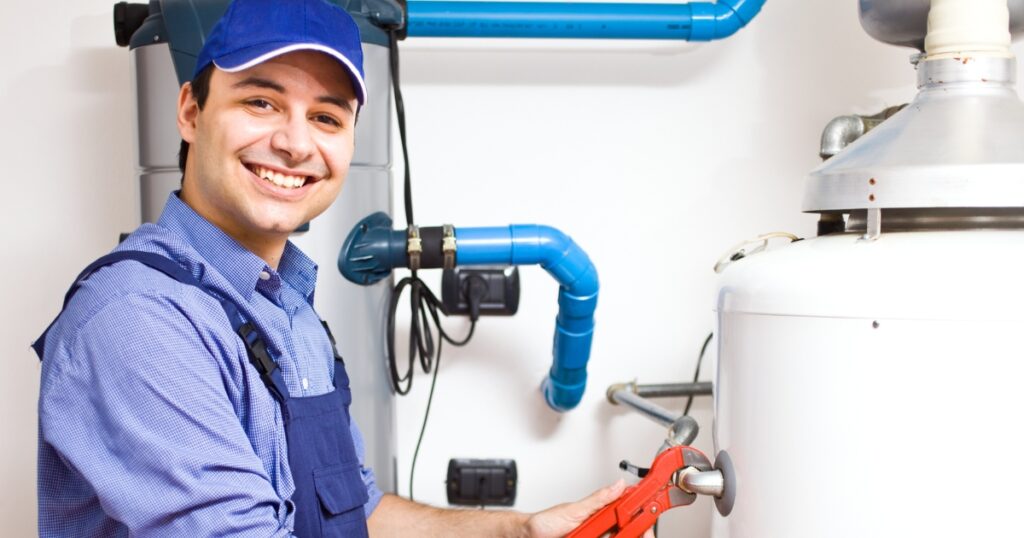Feeling the pinch when that energy bill lands in your letterbox, all thanks to your clunky old hot water system? You’re not alone —we’ve all been grappling with those pesky bills and reckon it’s time for a yarn about how you could slash those costs.
Have a squiz at our blog where we chew the fat about heat pump water heaters. These beauties can run on just a third of the juice compared to those old dinosaurs chugging away in our laundry rooms.
We’ve got a swag of tips ready for you on making the switch to an efficient hot water system that won’t leave your wallet feeling lighter or interrupt your cosy showers.
So, don’t let your hard-earned cash go down the gurgler! Dive into our advice and find out how to score some real savings—your wallet (and family) will thank you for it!
Key Takeaways
- Upgrading to an energy-efficient hot water system can cut energy use by up to 70%, saving money and reducing environmental impact.
- Government incentives like the Victorian Energy Upgrades (VEU) programme offer rebates for making hot water systems more sustainable, easing the initial cost of upgrades.
- Heat pump water heaters are worth considering as they use only about 30% of the electricity traditional systems need, providing long-term savings on household bills.
- When choosing a new hot water system, consider your family’s size and usage habits to find a balance between sufficient supply and efficiency for additional energy savings.
- Solar hot water systems harness sunlight to heat water, offering cost-effective and environmentally friendly benefits with potential government rebates available.
The Importance of Upgrading Your Hot Water System
Moving from the basics, let’s delve into why giving your hot water system an overhaul is a smart move. Upgrading to an energy-efficient hot water system can lead to significant savings on our household bills.

Consider that heat pump water heaters consume only 30% of the electricity compared to traditional systems; it’s clear how this switch can reduce our monthly outlay on energy.
Furthermore, we’re not just talking about monetary benefits here. Choosing more efficient options like these places us on the front lines in the battle against excessive energy consumption and environmental impact.
It means less electricity use, fewer emissions, and a lighter ecological footprint for all of us. Better yet, government incentives are there to support our transition through schemes like NSW Energy Saving and Victorian Energy Upgrades (VEU), making upfront costs less of a hurdle for homeowners eager to embrace greener living with efficient upgrades for their hot water needs.
Types of Energy-Efficient Hot Water Systems
We will explore different options for energy-efficient hot water systems, including electric storage, solar, and heat pump systems. Each type has its benefits and considerations that homeowners should take into account when upgrading their hot water systems.
Electric storage
Electric storage hot water systems use electricity to heat and store water in an insulated tank, ensuring a constant supply of hot water. While they are common in many households, electric storage systems tend to be less energy-efficient compared to other options.
Upgrading to a more efficient system like a heat pump can significantly lower energy consumption and reduce utility bills. Additionally, government incentives such as the Victorian Energy Upgrades (VEU) program offer rebates for replacing inefficient electric storage hot water systems with more sustainable alternatives, making it easier for homeowners to make the switch.
By upgrading your electric storage hot water system, you not only improve energy efficiency but also contribute towards reducing overall household energy consumption and lowering greenhouse gas emissions.
Solar
Considering solar hot water systems for your household can lead to significant energy and cost savings. Solar systems use sunlight to heat water, reducing the need for electricity or gas.
With government incentives available for households to upgrade to a more efficient hot water system, such as solar options, now is an ideal time to invest in renewable energy solutions.
Solar hot water systems are a sustainable improvement that can help reduce both energy usage and greenhouse gas emissions, making them an eco-friendly choice for your home.
Heat pump
Heat pump water heaters are highly efficient and use only 30% of the energy that a traditional electric hot water system does. Upgrading to a more efficient heat pump water heater can result in long-term cost savings for households and help reduce the amount of energy and water used in the household.
Government incentives are available for households to make this upgrade, allowing residents to lower their residential electricity bills while contributing to a more sustainable future.
Government Incentives for Upgrading Hot Water Systems
We’ll also discuss the eligibility and available rebates for upgrading to energy-efficient hot water systems. Find out how you can save money and reduce your environmental footprint by making the switch! Read more to learn about government incentives for upgrading hot water systems.
Eligibility
To be eligible for government incentives to upgrade your hot water system, you need to be a homeowner in the state where the program is being offered. The Victorian Energy Upgrades (VEU) program, for example, provides rebates for replacing inefficient electric storage or gas hot water systems.
Similarly, residents in New South Wales can take advantage of the current energy-saving scheme to reduce their residential electricity bills by upgrading their hot water systems. It’s important to check your eligibility and the specific requirements of each incentive program before making a decision.
Choosing an energy-efficient hot water system not only helps reduce your household’s energy and water usage but also leads to long-term cost savings. With various programs aimed at encouraging households to make these upgrades, it’s worth looking into whether you meet the eligibility criteria and can benefit from available incentives.
Available rebates
Government incentives are available to help with the cost of upgrading to a more energy-efficient hot water system. The Victorian Energy Upgrades (VEU) program, for instance, provides rebates for households looking to replace inefficient electric storage, gas storage, or gas instantaneous hot water systems.
Additionally, there are incentives specifically aimed at replacing existing hot water systems with more efficient heat pump models. These rebates can make it more affordable for homeowners to invest in a new system that will result in long-term cost savings and reduce energy consumption.
By taking advantage of these rebates, homeowners can reduce their residential electricity bills while also contributing to lower energy usage and greenhouse gas emissions. Upgrading your hot water system not only benefits your household financially but also supports environmental sustainability by reducing energy and water consumption.

Choosing the Right Size Hot Water System
When upgrading your hot water system, it’s important to consider factors like the number of people in your household and their hot water usage habits. To find out more about choosing the right size hot water system for your home, keep reading!
Factors to consider
When considering the upgrade for your hot water system, it’s important to keep the following factors in mind:
- Size: Ensure that the new hot water system is appropriately sized for your household’s needs to avoid energy wastage.
- Energy efficiency: Look for a hot water system with a high energy star rating to minimise electricity usage.
- Type of fuel: Consider the availability and cost of fuel options such as electricity, gas, or solar power in your area.
- Climate impact: Assess how different types of hot water systems affect greenhouse gas emissions and choose an option with a lower environmental impact.
- Long-term cost: Calculate the overall lifetime costs, including installation, maintenance, and operating expenses, to understand the financial implications of each type of hot water system.
- Government incentives: Research available rebates and incentives for energy-efficient hot water systems that could offset some of the initial costs while contributing to long-term savings.
Recommended tank size
When considering the recommended tank size for your hot water system, it’s important to take into account the number of occupants in your household and their hot water usage habits.
The size of the tank should be large enough to meet your family’s peak hot water demand while also ensuring energy efficiency. Choosing a smaller tank may lead to frequent heating cycles, increasing energy consumption and costs.
On the other hand, an oversized tank can result in unnecessary heat loss and higher upfront costs.
Other considerations
When considering upgrading to a more energy-efficient hot water system, it’s essential to evaluate the installation requirements. Ensuring that your home meets the necessary space and infrastructure needed for the new system is vital for a smooth transition.
Additionally, when exploring different types of energy-efficient hot water systems, it’s crucial to consider their long-term maintenance needs and costs. Regular maintenance can ensure optimal performance and longevity while keeping operating costs low.
Another consideration is understanding the warranty coverage for your chosen energy-efficient hot water system. Familiarising yourself with the details of the warranty can provide peace of mind in case of any unexpected malfunctions or issues with the new system.
Considerations for Specific Hot Water Systems
When it comes to specific hot water systems, it’s important to consider the unique features and requirements of each type. Whether you’re looking at electric resistance systems, solar hot water systems, hydro systems, gas systems, instantaneous systems or heat pump systems, there are key factors to keep in mind for optimal energy efficiency.
Electric resistance systems
Electric resistance hot water systems are a common type of traditional electric storage system. These units directly heat the water using electrical resistance, converting the electricity into heat.
However, they are known to be less energy-efficient compared to other options available today. Homeowners need to consider upgrading their electric resistance system to more efficient alternatives such as heat pumps or solar hot water systems.
By making this switch, households can significantly reduce their energy consumption and lower their monthly utility bills.
When looking for an upgrade, keep in mind that heat pumps use up to 30% less energy than electric resistance systems and can result in long-term cost savings due to their high-efficiency levels.
Additionally, there are government incentives offered for households aiming to transition from electric resistance systems to energy-efficient options like heat pump water heaters.
Solar hot water systems
Solar hot water systems use the sun’s energy to heat water, providing an eco-friendly and cost-effective alternative to traditional electric or gas systems. By harnessing solar power, these systems can significantly reduce household energy consumption and lower electricity bills.
With government incentives available for upgrading to solar hot water systems, homeowners can take advantage of rebates and savings while contributing to a more sustainable future.
By switching to a solar hot water system, households can enjoy long-term cost savings while reducing their environmental footprint. These energy-efficient upgrades not only benefit the individual homeowner but also contribute to overall energy conservation efforts at a community level.
Hydro systems
Hydro systems use the power of moving water to heat your hot water and are an eco-friendly option. These systems harness the natural force of flowing water to generate energy, making them a sustainable choice for heating your home’s water supply.
By utilising this renewable energy source, households can reduce their reliance on traditional electricity or gas for heating hot water, leading to long-term energy and cost savings.
With government incentives available for upgrading to more efficient hot water systems, including hydro systems, it’s worth considering this environmentally friendly option. The reduced environmental impact and potential cost savings make hydro systems an attractive choice for homeowners looking to upgrade their hot water systems while also minimising their carbon footprint.
Gas systems
Gas systems are a popular choice for hot water heating, offering efficient and reliable performance. Upgrading to an energy-efficient gas hot water system can lead to significant cost savings on energy bills.
With government incentives available for households to switch to more efficient hot water systems, such as heat pump water heaters, now is the ideal time to consider making the switch.
When deciding whether to upgrade your current gas system, consider the long-term benefits of reduced energy consumption and lower utility costs. By choosing a more energy-efficient hot water system, you can contribute positively towards reducing emissions and conserving resources for a sustainable future.
Making the shift to an energy-efficient gas hot water system can be a valuable investment in your home’s overall energy efficiency.
Instantaneous systems
Instantaneous hot water systems provide hot water only when needed, eliminating the need for a storage tank. This energy-efficient option heats water directly as it flows through the unit, reducing standby energy losses and ensuring a constant supply of hot water.
Government incentives are available to help homeowners upgrade to efficient instantaneous systems, contributing to lower energy bills and reduced environmental impact.
Switching to an instantaneous system can result in significant long-term cost savings due to its high efficiency and on-demand heating capabilities. With a reliable supply of hot water precisely when required, households can enjoy energy savings while contributing to overall energy conservation efforts.
Heat pump systems
Upgrade to a highly efficient heat pump water heater, which uses only 30% of the energy consumed by a traditional electric hot water system. Enjoy long-term cost savings with this energy-efficient option and take advantage of government incentives available for households looking to make the switch.
By choosing a more efficient hot water system, you can significantly reduce your household’s electricity consumption and lower your energy bills. Consider upgrading today to benefit from both environmental and financial advantages.
Upgrade Your Hot Water System Today
In conclusion, upgrading your hot water system to an energy-efficient option can lead to significant cost savings. Choosing the right system based on your household’s needs and the available government incentives is crucial.
By improving energy efficiency, you’ll reduce both electricity usage and emissions, contributing to a greener environment. Making this switch will not only benefit your household financially but also contribute positively to sustainable living practices in the long run.






